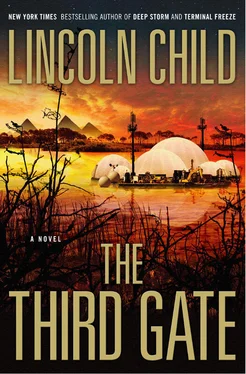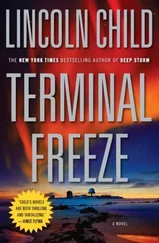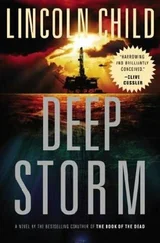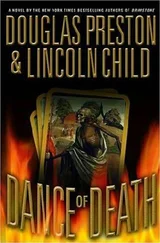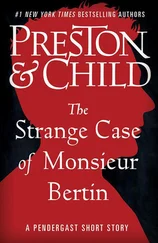Lincoln Child - The Third Gate
Здесь есть возможность читать онлайн «Lincoln Child - The Third Gate» весь текст электронной книги совершенно бесплатно (целиком полную версию без сокращений). В некоторых случаях можно слушать аудио, скачать через торрент в формате fb2 и присутствует краткое содержание. Жанр: Триллер, на английском языке. Описание произведения, (предисловие) а так же отзывы посетителей доступны на портале библиотеки ЛибКат.
- Название:The Third Gate
- Автор:
- Жанр:
- Год:неизвестен
- ISBN:нет данных
- Рейтинг книги:3 / 5. Голосов: 1
-
Избранное:Добавить в избранное
- Отзывы:
-
Ваша оценка:
- 60
- 1
- 2
- 3
- 4
- 5
The Third Gate: краткое содержание, описание и аннотация
Предлагаем к чтению аннотацию, описание, краткое содержание или предисловие (зависит от того, что написал сам автор книги «The Third Gate»). Если вы не нашли необходимую информацию о книге — напишите в комментариях, мы постараемся отыскать её.
The Third Gate — читать онлайн бесплатно полную книгу (весь текст) целиком
Ниже представлен текст книги, разбитый по страницам. Система сохранения места последней прочитанной страницы, позволяет с удобством читать онлайн бесплатно книгу «The Third Gate», без необходимости каждый раз заново искать на чём Вы остановились. Поставьте закладку, и сможете в любой момент перейти на страницу, на которой закончили чтение.
Интервал:
Закладка:
“I knew it,” he breathed.
Rush was seated across the aisle. Hearing this, he glanced over.
“We’re in Egypt,” Logan said.
Rush nodded.
Despite a carefully cultivated stoicism, Logan felt a shiver of excitement. “I’ve always wanted to work in Egypt.”
Rush sighed-half in amusement and half, perhaps, in regret. “I hate to disappoint you, Dr. Logan,” he said. “But actually, it’s nothing quite as straightforward as Egypt.”
3
Logan had been in Cairo only once before, as a graduate student documenting the movements of Frisian soldiers during the Fifth Crusade. And it seemed to him-as they drove along the highway from Cairo International-as if all the cars he’d noticed twenty years before were still on the road. Ancient Fiats and Mercedes Benzes, sporting dents and broken headlights, jockeyed frantically for position, making their own impromptu lanes at sixty miles per hour. They passed buses, decrepit and rusting, people hanging precariously from empty frames where the passenger entrances ought to have been. Now and then Logan caught sight of late-model European sedans, brilliantly polished and almost invariably black. But aside from these exceptions, the freeway traffic seemed one feverish anachronism, a time capsule from an earlier age.
Logan and Rush sat in the rear of the car, silently taking in the sights. Logan’s luggage had been left on the plane, and their driver-a local driving a Renault only slightly less aged than those around them-had expertly navigated the maze of airport access roads and was now headed into Cairo proper. Logan saw block after block of almost identical cement buildings, painted mustard, a half-dozen stories high. Clothes were drying on balconies; windows were covered with canvas awnings displaying a confusing welter of advertisements. The flat roofs were festooned with satellite dishes, and innumerable cables hung between buildings. A faint orange pall hung over everything. The heat, the unblinking sun, were merciless. Logan leaned out the wide-open window, gasping in the diesel-heavy air.
“Fourteen million people,” Dr. Rush said, glancing his way. “Crammed into two hundred square miles of city.”
“If Egypt isn’t our destination, why are we here?”
“It’s just a brief stop. We’ll be back in the air before noon.”
As they approached the city center and left the highway for local roads, traffic grew even denser. To Logan, every intersection seemed like the approach to the Lincoln Tunnel: a dozen cars all struggling to squeeze into one or two lanes. Pedestrians flooded the streets, taking advantage of the gridlock to cross willy-nilly, missing cars by scant inches. Somehow, grievous injury was avoided. Downtown, the buildings were no taller, but the architecture was more interesting, oddly reminiscent of the Rive Gauche. Security became increasingly evident: black-uniformed police were posted in booths at intersections; hotels and department stores had their frontages blocked by concrete fortifications to prevent car bombings. They passed the US Embassy, a fortress bristling with. 50-caliber machine-gun posts.
A few minutes later, the car abruptly pulled to the curb and stopped. “We’re here,” Rush said, opening his door.
“Where’s ‘here’?”
“The Museum of Egyptian Antiquities.” And Rush stepped out of the car.
Logan followed, careful to avoid the press of bodies, the cars that passed close enough to ruffle the fabric of his shirt. He glanced up at the grand facade of rose-colored stone across the entrance plaza. He had been here, too, during his graduate research. The tingle of excitement that he’d first felt on the plane grew stronger.
They crossed the plaza, fending off trinket sellers hawking glow-in-the-dark pyramids and battery-powered toy camels. Bursts of high-speed Arabic peppered Logan from all sides. They passed a brace of guards flanking the main entrance. Just before stepping inside, Logan heard a voice, crackling with amplification, suddenly rise above the din of traffic and the chatter of package-deal tourists: the chant of the muezzin in the local mosque across Tahrir Square, calling the faithful to prayer. As he paused, listening, Logan heard the call taken up by another mosque, then another, the chant moving Doppler-like into greater and greater distances, until it seemed to echo across the entire city.
He felt a tug at his elbow. It was Rush. Logan turned and stepped inside.
The ancient structure was crowded even at this early hour, but the sweaty throngs had not yet warmed the stone galleries. After the fierce sunlight, the interior of the museum seemed exceedingly dark. They made their way through the ground floor, past innumerable statuary and stone tablets. Despite signs bearing warnings against camera usage and forbidding the touching of artifacts, Logan noticed that-even now-many of the exhibits were still open to the air rather than hermetically sealed, and showed signs of extensive handling. Passing the last of the galleries, they mounted a broad flight of stairs to the first floor. Here were row upon row of sarcophagi, laid out on stone plinths like sentinels of the shadow world. Along the walls were glass-fronted cabinets containing funerary objects of gold and faience, the cases locked with simple seals of lead and wire.
“Mind if I take a moment to inspect the grave goods of Ramses III?” Logan asked, pointing toward a doorway. “I believe it’s down that passage. I recently read in the Journal of Antiquarian Studies of a certain alabaster canopic vase one could use to summon-”
But Rush smiled apologetically, pointed at his watch, and merely urged Logan on.
They made their way to another staircase-this one narrower, missing its banister-and climbed to the next floor. It was much quieter here, the galleries devoted to more scholarly collections: inscribed stelae; fragments of papyri, faded and decaying. The lighting was dim, the stone walls grimy. Once Rush stopped to consult a tiny floor plan he pulled from his pocket, hand-sketched on a scrap of paper.
Logan peered curiously around half-open doors. He saw stacks of papyrus scrolls, shelved floor to ceiling in niches like so many wine bottles in a sommelier’s vault. Another room held a collection of masks of ancient Egyptian gods: Set, Osiris, Thoth. The sheer volume of artifacts and priceless treasures, the weight of so much antiquity on all sides, was almost oppressive.
They turned a corner and Rush stopped before a closed wooden door. Inscribed in gold letters so faded as to be almost indecipherable were the words Archives III: Tanis-Sehel-Fayum. Rush glanced back briefly at Logan, then over his shoulder and down the empty hall. And then he opened the door and ushered Logan inside.
The room beyond was even darker than the hallway. A series of windows arrayed just below the high ceiling grudgingly admitted shafts of sunlight, heavily filtered through countless years of grime. There was no other illumination. Bookcases covered all four walls, stuffed to bursting with ancient journals, bound manuscripts, moldy leather-covered notebooks, and thick bundles of papyri, fastened together with desiccated leather stitching and in apparent disarray.
As Rush closed the door behind them, Logan took a step into the room. It smelled strongly of wax and decaying paper. This was precisely the kind of place he could find himself very much at home in: a clearinghouse for the distant past, a repository of secrets and riddles and strange chronicles, all waiting patiently to be rediscovered and brought into the light. He had spent more than his fair share of time in such rooms. And yet his experience was primarily in medieval abbeys and cathedral crypts and the restricted collections of university libraries. The artifacts here-the histories and the narratives, and the dead language most of them were written in-were very, very much older.
Читать дальшеИнтервал:
Закладка:
Похожие книги на «The Third Gate»
Представляем Вашему вниманию похожие книги на «The Third Gate» списком для выбора. Мы отобрали схожую по названию и смыслу литературу в надежде предоставить читателям больше вариантов отыскать новые, интересные, ещё непрочитанные произведения.
Обсуждение, отзывы о книге «The Third Gate» и просто собственные мнения читателей. Оставьте ваши комментарии, напишите, что Вы думаете о произведении, его смысле или главных героях. Укажите что конкретно понравилось, а что нет, и почему Вы так считаете.
